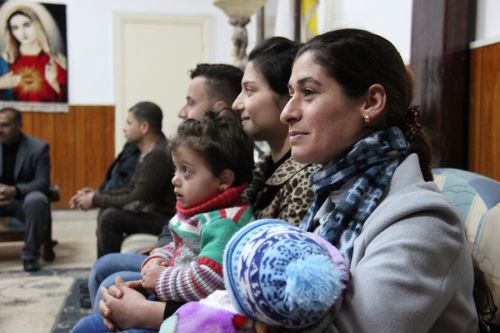Several bishops are saying we must resist the temptation to scapegoat all Middle Eastern refugees, since they themselves are fleeing violence similar to what happened in Paris last Friday. “We cannot and should not blame (refugees) for the actions of a terrorist organization,” Bishop Eusebio Elizondo Almaguer, auxiliary bishop of Seattle, said Nov. 17 during the United States bishops' general assembly. “These refugees are fleeing terror themselves—violence like we have witnessed in Paris. They are extremely vulnerable families, women, and children who are fleeing for their lives,” said the bishop, who is chair of the bishops' committee on migration. Coordinated gun and bomb attacks linked to militants of the Islamic State killed 129 people in Paris Nov. 13, and wounded some 350 others. Officials have identified one of the suspected terrorists as a Syrian national who they believe posed as a refugee to gain entry into France. Several other suspected attackers, however, are French nationals. Bishop Elizondo condemned the Paris attacks, saying, “I offer my deepest condolences to the families of the victims of the November 13 attacks in Paris, France and to the French people. I add my voice to all those condemning these attacks and my support to all who are working to ensure such attacks do not occur again — both in France and around the world.” In response to the Parish attacks, some federal and state officials, including the governors of more than 30 states, have called on an end to the resettlement of Syrian refugees in the United States. Bishop Elizondo commented that the screening process for refugees to gain entry into this country contains more security checks and interviews “than any arrival to the United States,” highlighting that the process can take more than two years. Shutting out those seeking refuge from violence in their homeland is not the answer, Bishop Elizondo said. Instead, the U.S. should consider “strengthening the already stringent program,” while at the same time continuing to “welcome those in desperate need.” He added that public officials should continue to unite in making sure the Syrian civil war reaches a peaceful resolution soon. “Until that goal is achieved, we must work with the world community to provide safe haven to vulnerable and deserving refugees who are simply attempting to survive.” Similarly, Bishop Thomas Tobin of Providence issued a statement Nov. 16 saying that “it would be wrong for our nation and our state to refuse to accept refugees simply because they are Syrian or Muslim. Obviously the background of all those crossing our borders should be carefully reviewed for reasons of security.” “Too often in the past, however, our nation has erroneously targeted individuals as dangerous simply because of their nationality or religion. In these turbulent times, it is important that prudence not be replaced by hysteria.” Bishop Tobin added that “as is our well-established practice, the Diocese of Providence stands ready to assist in a careful and thoughtful process of refugee resettlement.” And the Diocese of Cheyenne responded Nov. 18 to Governor Matt Mead's call to stop Syrian refugee resettlement saying it is “appreciative of Governor Mead’s responsibility to ensure the safety and security of all of Wyoming’s citizens.” The statement of Deacon Mike Leman, the diocese's legislative liaison, added that “we hope the governor has in mind a means in which the vetting process can be measured in an expedient manner, so that a resettlement option for those fleeing from war can once again be considered.” “It is important to remember that these are our fellow human beings who are fleeing the same kind of terror that occurred last week in Paris. By denying them sanctuary, we play into the hands of terrorists. We believe that this is not an either or issue. Measured steps can and should be taken to ensure safety while also allowing that Wyoming continues to be a welcoming place.” Since the Syrian civil war began in March 2011, more than 4.1 million Syrians have fled their homeland. Most are in Turkey and Lebanon, but many are seeking asylum in Europe and the United States. In September the Obama administration announced that the United States was to take in 10,000 Syrian refugees over the next year. To date, the country has already accepted about 1,800 refugees from Syria. Candidates for resettlement are vetted by several federal agencies, which takes 18-24 months on average. According to the BBC, about half of applicants are approved for resettlement, and the American process is much stricter than that in Europe. But some officials, such as FBI director James Comey, worry that United States intelligence in Syria isn't good enough to prevent “gaps” in the process. Sen. Marco Rubio, a Republican presidential candidate, told ABC, “There is no background-check system in the world that allows us to find that out, because who do you call in Syria to background-check them?” House Speaker Paul Ryan called Nov. 17 for a “pause” in Syrian refugee resettlement in the United States to allow Congress to “verify that terrorists are not trying to infiltrate the refugee population.” Ryan added that “Our nation has always been welcoming. But we cannot let terrorists take advantage of our compassion. This is a moment where it's better to be safe than to be sorry.” Rep. Michael McCaul, chairman of the House Homeland Security Committee, has introduced a bill that would place new restrictions on the entry of Iraqi and Syrian refugees to the United States. Several governors, however, have indicated they will continue to welcome Syrian refugees, including those of Utah, Colorado, Connecticut, Pennsylvania, Washington, Vermont, and Hawaii.

